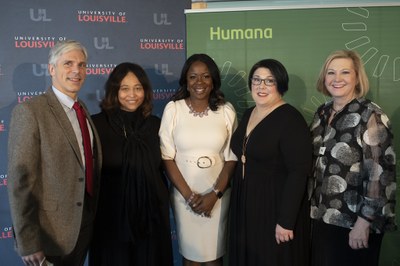SPHIS Home » News » UofL, Humana, Humana Foundation announce up to $25M innovation hub to boost health equity for marginalized populations
UofL, Humana, Humana Foundation announce up to $25M innovation hub to boost health equity for marginalized populations

The University of Louisville, Louisville-based Humana Inc. and The Humana Foundation today announced a new cooperative agreement and additional financial investment in the university’s Health Equity Innovation Hub to advance health equity and improve health outcomes for marginalized populations in Louisville and communities around the world.
The Hub is funded by a potential total investment of $25 million, including $10 million from UofL, $1.5 million from Humana and up to $13.5 million from The Humana Foundation. The investment by The Humana Foundation represents one of the largest single donations in UofL’s history and is contingent upon progress against the collaboration’s objectives and achievement of established milestones.
The Health Equity Innovation Hub is an integrated, multi-disciplinary collaboration among Humana, The Humana Foundation and UofL. The Hub will focus on groundbreaking research, talent development, entrepreneurship and innovation, with a deliberate focus on health equity, social determinants of health and digital health and analytics.
“Humana is committed to improving health equity and we will be intentional about addressing the underlying societal and structural factors that impede good and fair health, especially for people in communities that have been historically marginalized and made vulnerable,” said Dr. Nwando Olayiwola, chief health equity officer and senior vice president at Humana. “This unique collaboration with the University of Louisville and The Humana Foundation to create the Health Equity Innovation Hub is an exciting opportunity for Humana to partner with a leading research institution in our founding city where so many health disparities exist, establish shared goals and drive positive change beginning in local communities.”
Enabled by Humana and The Humana Foundation’s investment and support, the Hub will seek to develop solutions for health inequities in Louisville and globally. This includes the up-skilling and re-skilling of community members who have been underserved to provide a talent pipeline for Louisville’s significant concentration of major health care companies, thereby creating a pathway for family-sustaining jobs. The Hub will also conduct dedicated outcomes-based research on population and social health issues to derive a wide range of insights on how to mitigate health inequities and the adverse impacts of health-related social needs. In addition, the Hub will support diverse creators, innovators and entrepreneurs whose ideas can positively impact populations around the world that have historically been marginalized and underserved.
“UofL is a research powerhouse dedicated to making a positive impact on our world and addressing the challenges affecting the human condition,” said UofL Interim President Lori Gonzalez. “We are proud to work with Humana and The Humana Foundation to further health equity for all through this new Hub. Together, we can have a tangible impact that benefits our shared community and far, far beyond.”
UofL is among the top U.S. research institutions, holding the Carnegie Classification of Institutions of Higher Education’s “Research 1” designation for doctoral universities with very high research activity. In addition to being a Research 1 institution, UofL also holds the Carnegie community-engaged designation, which recognizes institutions that work with community partners to exchange knowledge and resources for public benefit. UofL is one of just 79 U.S. institutions to hold both designations.
At UofL, the Hub is led by Dr. Monica Wendel, a renowned public health researcher with significant expertise in health equity. A national search is currently underway to fill the role of executive director. The Hub’s leadership team also includes Deputy Director Ben Reno-Weber, a seasoned tech entrepreneur who previously led the Microsoft Future of Work Initiative; Director of Community Engagement Ivory Rollins Cross, a Louisville native and community champion; and Director of Innovation and Social Entrepreneurship Natalia Bishop, who founded prominent Louisville co-working brand, Story Louisville.
“Everything affects our health, our health affects everything. We all want to be healthy, but the choices people make are the choices people have. In seeking to advance health equity, then, we have to change the choices people have. And we have that opportunity,” Wendel said.
The Hub also will create and collaborate with advisory boards, including national thought leaders, community organizations and local community residents who are passionate about improving social and health equity in their neighborhoods, as well as local business leaders and mentors from a diverse cross-section of the health equity ecosystem.
The launch of the Hub will further UofL’s three Grand Challenge strategic research priorities identified and launched in 2020, which include: Empowering our Communities, Advancing our Health and Engineering our Future Economy. The investment from Humana will advance the first challenge, Empowering our Communities, with a focus on promoting equity by engaging partners and strategically integrating research, innovation and training to address complex social and structural issues driving health inequity.
“These are huge challenges that will impact our world for years to come,” said UofL’s Executive Vice President for Research and Innovation Kevin Gardner. “Through this Hub and work with our partners at Humana and The Humana Foundation, UofL research and innovation will help empower those in our community — promoting equity, eliminating disparities and strengthening the ability of all individuals to achieve well-being and prosperity.”
The Hub’s mission also is well-aligned with Humana’s Bold Goal of advancing the health of the communities it serves by addressing social determinants of health and the health-related social needs for its members and communities.






